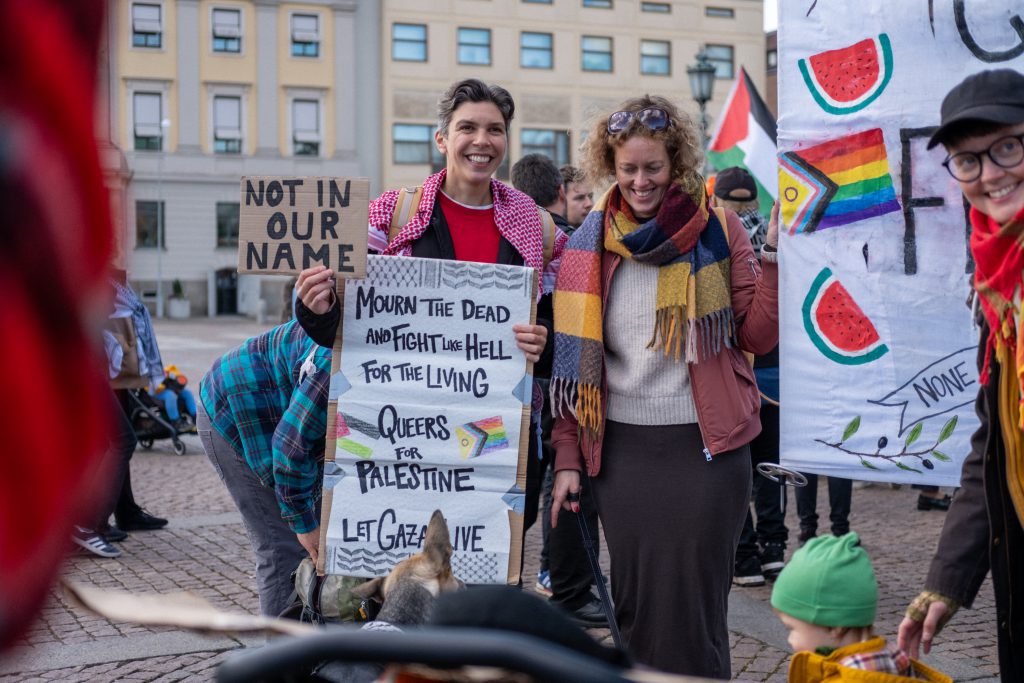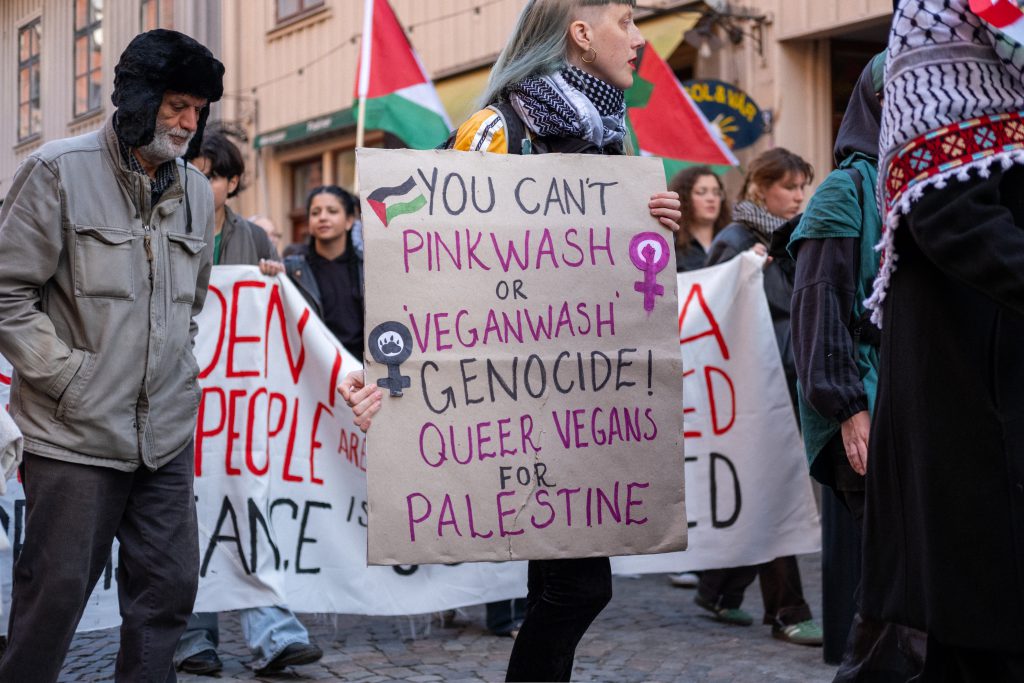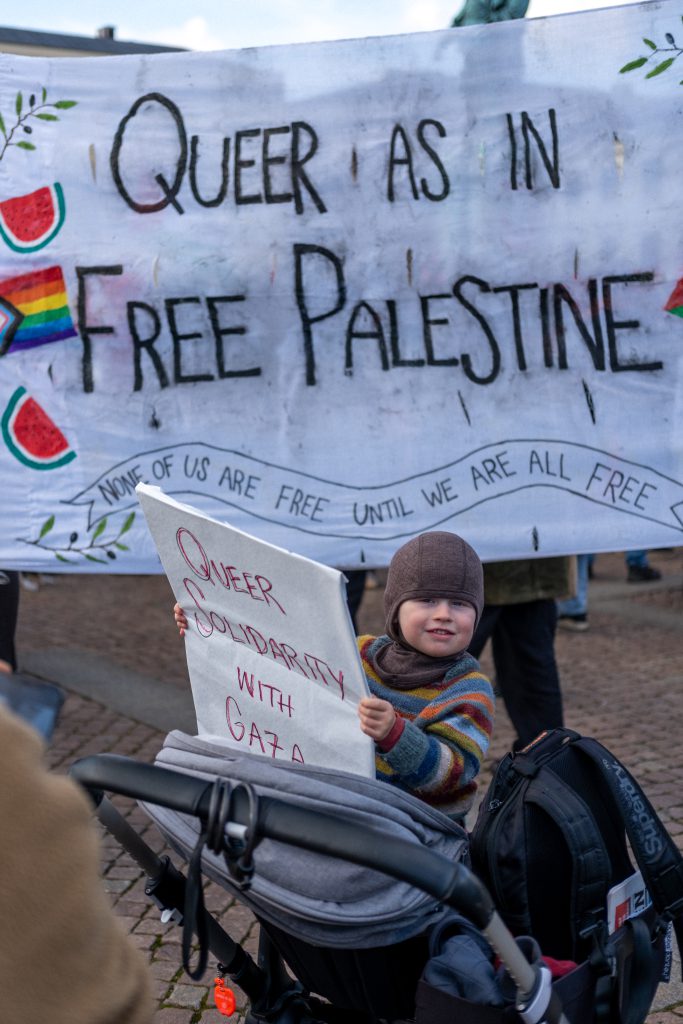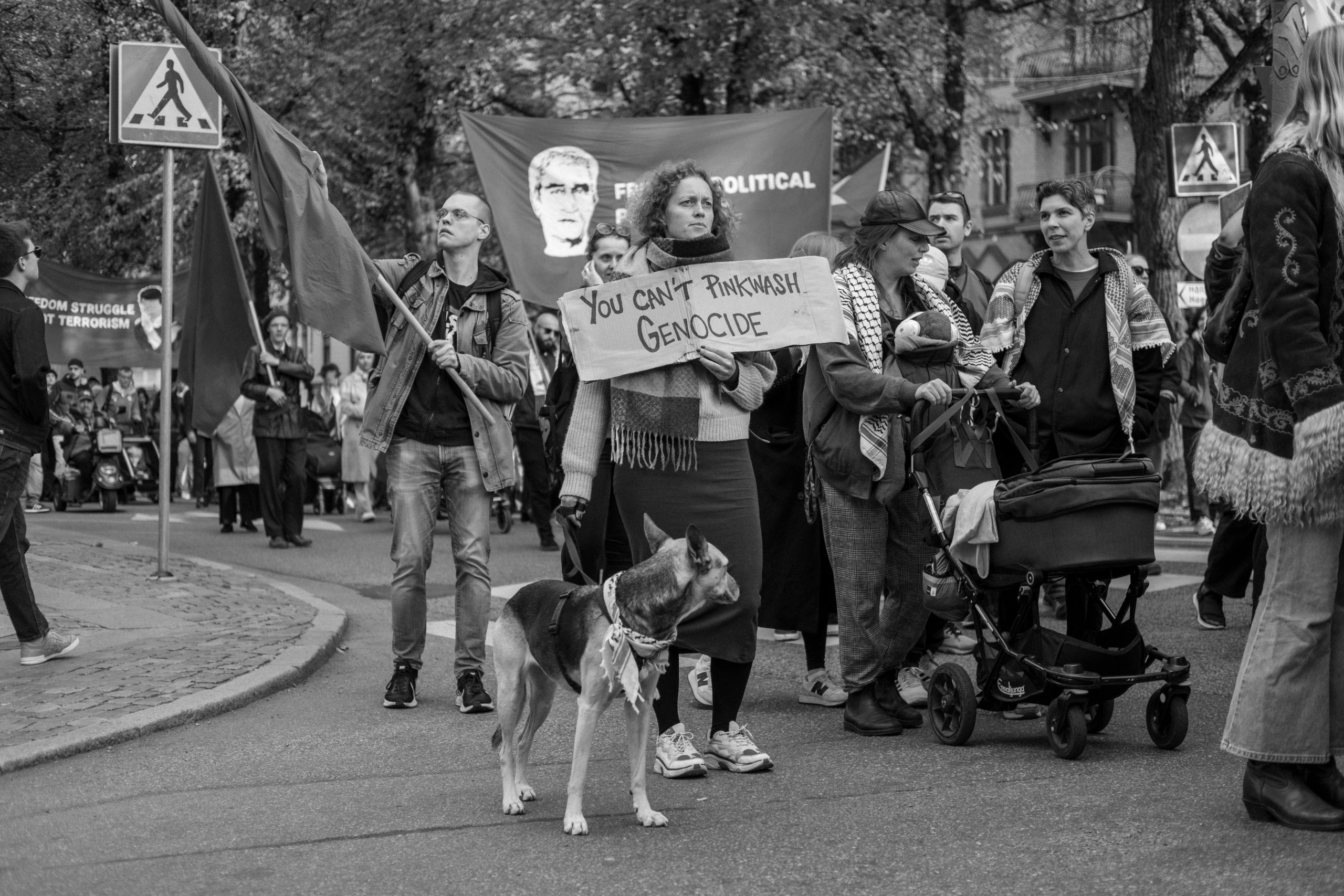In an increasingly interconnected world, digital platforms have become crucial spaces for activism, particularly for marginalized communities fighting for justice and equality. Together with the physical space, these platforms are contested arenas where activists face forms of surveillance, censorship, and repression.
This interactive post was inspired by current conversations on social media surrounding the global resurgence of solidarity with Palestine’s liberation struggle and its connection to movements for queer liberation. Drawing on these themes, this is a report of a conversation with Vienna-based queer pro-Palestinian activists. Their experience sheds light on the perception of repression of pro-Palestinian activism both online and offline, while showing the chilling effect of repression on human rights activism.
Queer pro-Palestinian activism: a space for dialogue
The creation of groups of queer people doing pro-Palestinian activism came out of a need for community, safety, and a space for dialogue. After October 7th and the Israeli offensive on Palestinians in Gaza, people started coming together, showing up at protests in solidarity with Palestinians every Saturday. Even before pro-Palestinian queers officially became a group, just a few of them bringing pride flags sparked tension. Some fellow protesters questioned why they were there, saying things like, “This flag has nothing to do with the cause.” Meanwhile, outsiders attacked them saying “Queers for Palestine is like chicken for KFC”.

Using social media for Palestinian and queer liberation
The group leverages social media for four main purposes, starting with mobilization. While activists often use Telegram or private channels, many people without access to those spaces remain unaware of events. For pro-Palestinian activists, Instagram bridges the gap between activist circles and the broader public.
Accessibility is another key factor. Much activist organizing happens privately, but the group aims to share as much as they safely can. Many followers are “liberal-ish” queers who may know little about Palestine or activism. By sharing their actions and motivations, the group hopes to educate and inspire deeper engagement with Palestinian rights actvisim targeting queer people in Europe.
Social media also facilitates connections with other organizations, enabling collaboration and strategy-sharing. Lastly, it serves as a platform for witnessing. During events like encampments, they document and share occurrences, especially police repression, to inform those who can’t be present. For pro-Palestinian queers, social media helps with transparency, connection, and accountability.
Digital and Physical Harassment: Doxing & Hate Comments
Pro-Palestinian queer groups face overt and covert repression aimed at silencing their activism. Overt tactics include doxing, harassment, and threats of violence or legal action, often from private individuals and local authorities. They note that much of this harassment is done by “antideutsche” Zionists, who attend protests to photograph and monitor activists, exposing them to police or institutions. In one instance, a fellow pro-Palestinian protester also threatened to ask the police to remove them from a demonstration because of their pro-queer stance.
Online, hate comments are frequent. Most attackers are right-wing-leaning, expressing openly anti-queer and racist sentiments like, “You should just go back to Gaza and see what they do with you.” These type of remarks build on an anti-immigration rethoric, as well as a deeply colonial understanding of all non-Western societies as intrinsically patriarchal and illiberal. Other more left-leaning comments accuse them of antisemitism or, similalry to right-wing discourse, to be authoritarian and opposed to liberal and progressive values and on that base try to delegitimize their calls for justice.
Online Censorship & Disinformation Campaigns
Pro-Palestinian queers face significant repression through information control on Meta platforms like Instagram. They report issues such as shadow banning, content moderation, and deplatforming. Although they haven’t faced direct account bans, they confirm widespread suppression of terms like “Palestine” or “Intifada,” which disproportionately impacts activists, especially those with private accounts, limiting their reach.
They also contend with dis- and misinformation flooding social media to distort perceptions of their cause. Both state agents, like local politicians, and private actors use this tactic to misrepresent their activism as apology of terrorism, increasing the perception of pro-Palestinian protesters as a threat to Jewish people. Activists recall a politician repeatedly tagging their group in Instagram stories during the pride, flooding their account with unbased accusations of antisemitism, and the police dismantling the students encampment in connection to complaints from the association of Jewish Austrian University Students.
Fake accounts add to the problem by issuing anonymous threats and harassment, especially around solidarity events like markets or fundraisers for people surviving the genocide. These examples show how pro-Palestinian activists in Austria are the target of a range of potential repressors, including private companies, state actors and private actors, both organized groups and individuals.

Feelings of Constant Surveillance & Chilling Effect
When it comes to surveillance, pro-Palestinian queer activists share a general feeling that the police are aware of their activities, but they aren’t certain how much of that awareness is linked to their social media presence. They suggest that being visible in public spaces, especially on the streets, is more likely to draw police attention, however have also suspected private accounts to potentially have direct connection with the police.
The experiences they describe feed into a creeping sense of surveillance and perceived repression, both online and offline.
Pro-Palestinian queers face repression from non-state actors who often mimic or cooperate with authorities. Much monitoring and doxing is carried out by organized non-state groups, who attend protests, photograph activists, and report them. This unofficial, state-backed surveillance blurs the line between state and non-state repression, making organizers feel increasingly unsafe in everyday interactions when sharing their political opinion.
To counter these threats, the group practices self-censorship, especially online. They avoid sharing sensitive information, prioritizing safety over visibility. This limits outreach but feels essential. “There’s no such thing as being too careful,” one member said, noting that even small mistakes could lead to privacy breaches, criminalization, job loss, or public defamation.
Though the group is far from fundamentalist or violent ideologies, sticking to peaceful actions like protests, sit-ins, and statements, they still self-censor online because of the potential for criminalization and repression.

Uncovering Interconnected Systems of Oppression
Queer pro-Palestinian activists often face harassment and violence while protesting the genocide in Palestine, both within and outside the movement. At demonstrations, queerphobia persists, with some protesters refusing to link queerness to the Palestinian cause or rejecting visibly queer participants.
This creates tense situations where the group must defend their presence—especially when displaying their pride flag with the Palestinian flag, which many find provocative. Offline, harassment can escalate to physical confrontations, such as attempts to snatch their flag, often by passersby or other protesters.
Online, the hostility comes from different sources. “I think I have literally never seen a hate comment by a person who is pro-Palestinian”, reports someone from the group, while Zionists often use online platforms to dismiss queer pro-Palestinian activism as “self-hating”. These attacks use racist and pinkwashing narratives, highlighting queerphobia in Palestinian or Muslim communities to discredit the movement or erasing queer Palestinians by imposing racist, heteronormative frameworks on pro-Palestinian activism.
Pro-Palestinian queers counter these narratives, emphasizing that queer liberation is inseparable from Palestinian liberation. In the words of the Jerusalem-based Palestinian NGO Al Qaws:
“Queer liberation is fundamentally tied to the dreams of Palestinian liberation: self-determination, dignity, and the end of all systems of oppression.
In a settler colonial context, no clear line can be drawn where colonialism ends and patriarchal violence begins.
The fight against patriarchy and sexual oppression is intertwined with the fight against settler-colonialism and capitalism.”
Intersectional Activism in the Face of Repression
Amid significant challenges, pro-Palestinian queer activists foster change through dialogue and bridge-building across diverse communities and across physical and digital activism.
They exemplify how intersectional solidarity transcends geographic and identity boundaries, carving out spaces for queer voices within the Palestinian liberation movement on the streets. Their work underscores that queer Palestinians exist and that the struggle for justice must simultaneously address national, anticolonial, and intersectional dimensions.
These activists also engage liberal queer audiences to dismantle Islamophobic and racist stereotypes that homogenize Palestinians, especially through digital activism. They highlight that queer Palestinians, often racialized or Muslim, cannot achieve sexual and social equity without collective self-determination and freedom from occupation.
At the same time, they continue their commitment for social justice within a context where huge private companies, such as Meta, and state actors constantly threaten their safety and curtail their freedom of expression, through well-reharsed disinformation campaigns that frame pro-Palestinian activism as connected to terrorism, antisemitic and otherwise illegal.
Despite their commitment to progressive ideals of inclusivity and the fight against various forms of oppression—queerphobia, Islamophobia, and racism—many pro-Palestinian queer activists report a pervasive sense of “paranoia.” The chilling effect of repression both in the physical and digital worlds weigh heavily on their efforts to advocate openly for the intertwined causes of Palestinian and queer liberation, leading to self-censorship and threatening to core of democratic freedoms.
Clau Tatangelo
